- Home
- Paul Fraser Collard
The Lone Warrior
The Lone Warrior Read online
Copyright © 2015 Paul Fraser Collard
The right of Paul Fraser Collard to be identified as the Author of the Work has been asserted by him in accordance with the Copyright, Designs and Patents Act 1988.
Apart from any use permitted under UK copyright law, this publication may only be reproduced, stored, or transmitted, in any form, or by any means, with prior permission in writing of the publishers or, in the case of reprographic production, in accordance with the terms of licences issued by the Copyright Licensing Agency.
First published as an Ebook by Headline Publishing Group in 2015
All characters – other than the obvious historical figures – in this publication are fictitious and any resemblance to real persons, living or dead, is purely coincidental.
Cataloguing in Publication Data is available from the British Library
Ebook conversion by Avon DataSet Ltd, Bidford-on-Avon, Warwickshire
eISBN: 978 1 4722 2272 5
Jacket design & Illustration © CollaborationJS
Author photo credit © Martin Collard
HEADLINE PUBLISHING GROUP
An Hachette UK Company
Carmelite House
50 Victoria Embankment
London EC4Y 0DZ
www.headline.co.uk
www.hachette.co.uk
Title Page
Copyright Page
About Paul Fraser Collard
Also by Paul Fraser Collard
Dedication
Praise
Acknowledgments
Glossary
Map – The Siege of Delhi
Epigraph
Chapter One
Chapter Two
Chapter Three
Chapter Four
Chapter Five
Chapter Six
Chapter Seven
Chapter Eight
Chapter Nine
Chapter Ten
Chapter Eleven
Chapter Twelve
Chapter Thirteen
Chapter Fourteen
Chapter Fifteen
Chapter Sixteen
Chapter Seventeen
Chapter Eighteen
Chapter Nineteen
Chapter Twenty
Chapter Twenty-one
Chapter Twenty-two
Chapter Twenty-three
Chapter Twenty-four
Chapter Twenty-five
Chapter Twenty-six
Chapter Twenty-seven
Chapter Twenty-eight
Chapter Twenty-Nine
Chapter Thirty
Chapter Thirty-one
Chapter Thirty-two
Chapter Thirty-three
Chapter Thirty-four
Chapter Thirty-five
Chapter Thirty-Six
Chapter Thirty-seven
Chapter Thirty-eight
Chapter Thirty-nine
Chapter Forty
Chapter Forty-one
Chapter Forty-two
Chapter Forty-three
Epilogue
Historical Note
Paul’s love of military history started at an early age. A childhood spent watching films like Waterloo and Zulu whilst reading Sharpe, Flashman and the occasional Commando comic gave him a desire to know more of the men who fought in the great wars of the nineteenth and twentieth centuries. At school, Paul was determined to become an officer in the British Army and he succeeded in winning an Army Scholarship. However, Paul chose to give up his boyhood ambition and instead went into the finance industry. Paul still works in the City, and lives with his wife and three children in Kent.
Also by Paul Fraser Collard
The Scarlet Thief
The Maharajah’s General
The Devil’s Assassin
Digital Short Stories
Jack Lark: Rogue
Jack Lark: Recruit
Jack Lark: Redcoat
To Martin, Andrew and Tamara
‘I love a writer who wears his history lightly enough for the story he’s telling to blaze across the pages like this. Jack Lark is an unforgettable new hero’ Anthony Riches
‘This is a fresh take on what could become a hackneyed subject, but in Fraser Collard’s hands is anything but’ Good Book Guide
‘Savage, courageous, and clever’ Goodreads
‘This is what good historical fiction should do – take the dry dusty facts from history books and tell the story of the men and women who lived through them – and Collard does this admirably’ www.ourbookreviewsonline.blogspot.co.uk
‘This is the first book in years I have enjoyed that much that I had to go back and read it again immediately’ www.parmenionbooks.wordpress.com
‘Collard is to be congratulated for producing a confident, rich and exciting novel that gave me all the ingredients I would want for a historical adventure of the highest order’ www.forwinternights.wordpress.com
As you may have guessed, I rather enjoy writing stories. This is the fourth Jack Lark novel, and the one I have enjoyed writing the most. But no writer, no matter how much fun they are having, can hope to produce a story alone, and so I would like to use this page to express my gratitude to those who have helped me.
My first thanks has to go to David Headley, the man who plucked me from an overwhelmingly large pile of submissions and breathed life into my dream of becoming a published writer. Dave continues to guide and shape both my career and my writing, and for that I shall always be in his debt.
The team at Headline do a fantastic job producing these books. Flora Rees, my editor, offers a sympathetic ear whenever I need it, and it is her wise advice and counsel that makes these stories a million times better than I could ever hope to make them by myself.
My work colleagues deserve a thank you for putting up with the never-ending chatter about my books. I am extremely fortunate to work with a wonderful team and I would like to thank everyone in ASL for their support. Lee, Jim and Kevin need a special mention as they bear the brunt of my daily conversation, and I can only thank them for their good humour and comradeship over the many years we have worked together. I also need to thank my boss, Jay, for his support.
Finally I must thank my family. They are what make all of this worthwhile.
alkalak – cavalry tunic
ayah – nurse, lady’s maid
babu – merchant
badmash – dishonest or unprincipled man
betel – nut used as a mild narcotic
bhang – chewy balls made from the buds of the female cannabis plant
bhisti – water-carrier
buzzer – thief who picks gentlemen’s pockets
caravanserai – travellers’ resting place
chamars – part of the Dalits – the lowest tier of the Hindu caste system
charpoy – camp bed, usually made of a wooden frame and knotted ropes
chokey – cholera
dacoit – bandit, thief
dak gharry – ost cart/small carriage pulled by horses
dhobi-wala – washerman
dhoti – loincloth
dirzi – tailor
doli – covered litter, sedan chair
fascine – bundle of wood used to strengthen a wall
firangi – derogatory term for a European
gabion – large cage or basket filled with rock
glacis – artificial slope
griffin – nickname for an officer newly arrived in India
Gujar – semi-nomadic caste from northern India
havildar – native rank of sergeant
hookah – instrument for smoking tobacco where the smoke is passed through a water basin before inhalation
houri – beautiful woman, used by the British to denote a woman of
easy virtue
Jat – tribe of north-west India
kamarband – cummerbund; waistband
kot-daffadar – native cavalry non commissioned officer, equivalent to a sergeant major
kothi – substantial town house often arranged around a number of courtyards
kurta – long shirt
lathi – wooden club
Maro! Maro! – Kill! Kill!
mehtar – sweeper
mofussil – country stations and districts away from the chief stations of the region
mohalla – district of a Mughal city – a series of residential lanes entered through a single gate, which would be locked at night
nabob – corruption of nawab (Muslim term for senior official or governor), used by the British to describe wealthy European merchants or retired officials who had made their fortune in India
namaste – slight bow made with hands pressed together, palms touching and fingers pointing upwards
pagdi – turban, cloth or scarf wrapped around a hat
palki – palanquin; box-litter for travelling in, carried by servants
pandy – colloquial name for sepoy mutineers, derived from the name of Mangal Pandey of the 34th Bengal Native Infantry
pankha-wala – servant operating a large cooling fan
qahwa khana – coffee house
ravelin – triangular fortification or detached outwork
rhino – cash, money
rissaldar – native cavalry officer, equivalent to a captain
sahib – master, lord, sir
sawar – cavalry trooper
serai – stopping place for travellers
seviyan – noodles similar to vermicelli
sola topee – light tropical helmet – forerunner of the pith helmet
subadar – native infantry officer, equivalent to a captain
Sufi – mystical Islamic belief and practice in which Muslims seek to find the truth of divine love and knowledge through personal experience of God
suttee – Hindu custom of a widow burning herself to death on her husband’s funeral pyre
syce – groom
tabor – small drum
talwar – curved native sword
tatties – grass window screens
thug – follower of a religious sect, renowned for carrying out ritualistic murders (thuggee)
Na Iran ne kiaya, na Shah Russ, angrez ko tabah kiya kartoosh ne.
The mighty English, who boast of having vanquished Russia and Persia, have been overthrown in Hindustan by a single cartridge.
Bahadur Shah II, King of Delhi, 1857
Calcutta, May 1857
‘Good evening, sahib, welcome to the Circle.’ The doorman pressed his palms together and bowed at the waist. The namaste was delivered with perfect politeness, but the smile under the golden pagdi was fixed in place, and there was no sign of it in the man’s eyes as they ran quickly over the figure that stood before him.
The tall, dark-haired Englishman nodded in acknowledgement of the greeting. His lean face revealed nothing of what he thought, his grey eyes emotionless as they assessed the two guards who hovered behind the more elegantly dressed doorkeeper.
‘Is this your first visit to the Circle, sahib?’
The Englishman gave the slightest shake of his head. ‘No.’
‘Then I must thank you for your custom. This way, please.’
The doorkeeper took a half-pace backwards and bowed for a second time, this time sweeping his arm in a theatrical gesture of welcome before waving away the bearers of the palki that had brought the sahib to the door of the exclusive club.
One of the two guards stepped to one side and opened the single door to the building behind them. There was no prominent signage displaying the club’s name. Indeed, if it were not for the presence of the smartly dressed doorkeeper and his guards, it was unlikely any passer-by would notice the unassuming side entrance that now opened for the Englishman.
Yet the Circle displayed its status in other ways. It did not blend well into its surroundings. The building was grand, the four stucco columns in front of it mimicking the style of the Palladian mansions built by the British in their part of town. It stood aloof from its neighbours, a mismatched collection of drab mud and thatch buildings that clung to its skirts like so many peasants begging alms from a lord. But the entrance to the secretive club was hidden away so that only those who were aware of its existence would know where to request entry. The Circle was a respectable venue but an exclusive one, open only to the wealthiest locals and a select handful of British officers and senior officials who sought a more colourful flavour to their entertainment.
The Englishman walked through the open door without hesitation. It led to a tiny corridor no more than three yards long. He did not turn round as the door behind him shut to leave him entombed in the tiny space. He faced the far end, looking at the second door that waited for him, hiding his tension behind a facade of calm indifference. He took a pace forward, standing tall as he felt a hidden scrutiny. His hand fell to his side, the fingers twitching as they failed to locate the handle of the sword they had instinctively expected to find there. No one was allowed to wear a blade in the Circle, but that did not mean everyone was unarmed, and the Englishman had to resist the urge to reach inside his heavy black dinner jacket and caress the cold, hard lump of the revolver stuffed into his kamarband.
The seconds passed, the passage of time marked by the slow tick of a clock on the wall of the corridor. For such a tiny space it was surprisingly elegant. The floor was of white marble, with the walls painted a dark crimson. A dozen small but fine paintings decorated each wall, but there was no window. The elegance was as much of a facade as the Englishman’s confidence, the confined space designed to hold a single guest whilst they were assessed through the gilded lattice grilles that were spaced at regular intervals along the walls.
The Englishman refused to turn his head to search for a flicker of movement behind the screens. Instead he waited patiently, standing stock still as he felt the hidden eyes roving over him. He tried not to think what it would be like to fight his way back through the entrance, telling himself that there had to be another way out, an easier escape route to be found away from the public entrance to the club.
The door in front of him opened.
‘Good evening, sahib, welcome back to the Circle.’ The keeper of the second door was dressed in identical fashion to his colleague outside, even down to the same faux-smile fixed on his face.
The Englishman grunted once in recognition of the second greeting. Without waiting to be invited, he marched forward, sweeping past the doorman and into the main reception room. He did his best not to show any emotion as he emerged into the graceful surroundings that welcomed guests after their temporary incarceration.
The room was spacious and bright, with elegant candelabra competing with vividly painted Chinese lanterns to fill the space with light. The rich decor reminded him of a maharajah’s palace. The walls were painted a neutral alabaster, with sweeping curtains of a simple white fabric smothering the dozen wide windows that were screened by grass tatties but otherwise left open; the cooling breeze that flowed into the room was circulated by the pankha-walas sitting silent in the corners. The door frames were of teak, decorated with elegant carvings depicting myriad flora and fauna, the intricate work the product of exquisite skill. The floor was of marble, the wide white expanse only broken by the fabulous splashes of colour provided by a single enormous and gaudy kelim rug positioned in the very centre of the room. It was a place of airy refinement and comfort, a haven of tranquillity away from the bustle and chaos of the teeming city of Calcutta.
‘This way, sahib.’ Another well-dressed servant arrived to usher the Englishman into the room. ‘Allow me to get you something to drink.’
The Englishman let himself be led through the first reception room and into another, decorated in the same elegant style. Unlike the first, it contained a long mahog
any table decked out with a full and inviting banquet. He recognised little, the dishes of unidentifiable stews and biryanis a feast for any guest arriving with a hunger for more than the other entertainments for which the Circle had earned its reputation.
‘Would you care for a drink, sahib? We have the very best French champagne. Or would you prefer a whisky? We have Kinahan’s from Dublin or Encore from Leith.’
‘Beer.’ The Englishman pursed his lips before turning his back on the overloaded table and walking towards another doorway on the far side of the room.
The servant fluttered his hands nervously and scurried forward to keep pace with his much taller guest. ‘Something to eat, sahib? If you do not see anything to your taste, we would be only too delighted to prepare something more delectable for your palate.’
The Englishman said nothing. He lifted his hand and used it to lever the over-attentive servant to one side, then strolled into the next room, drawn by the gentle murmur of voices that echoed through into the elegant reception spaces.
The gaming room smelt of money. Not the kind found in the great houses hidden in the depths of the English countryside, or on ostentatious display in the fabulous surroundings of a maharajah’s palace. This room promised something much more fleeting. It smelt of rhino. It smelt of cash.
A few of its occupants turned, acknowledging the presence of the stranger before quietly returning to their games, the lure of the cards of so much more interest than the arrival of a firangi. The Englishman smiled. The familiarity of the scene was reassuring, the gentle voices of the croupiers calling out the score echoing those he had heard in the more respectable clubs of Calcutta, the muttered phrases the same as in any room where French hazard was played. The focused stares of the players did not change, no matter what the colour of the gamers’ skin, their silent concentration adding intensity to the room so that a tense atmosphere simmered just beneath the cool air and graceful elegance.
Servants lined the walls, standing like so many bronze statues as they waited to cater to their patrons’ every whim. A dozen or more young boys sat in the corners, their heads bowed low as they pulled on the thick silk ropes that controlled the huge sail attached to the ceiling. Other servants glided past, moving silently around the periphery to douse the grass tatties that covered the open windows. The fibres were kept wet, cooling the hot breeze that billowed in and adding a delicate scent that helped to mask the smell of sweat and over-ripe flesh. The sweet-smelling air flowed around the room, making the chandeliers chime, their glass droplets coming together to create a gentle melody that underscored the hushed voices of the patrons and the staff who served them.

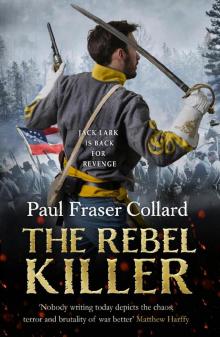 THE REBEL KILLER
THE REBEL KILLER The Lost Outlaw
The Lost Outlaw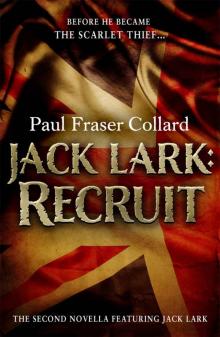 Jack Lark: Recruit (A Jack Lark Short Story)
Jack Lark: Recruit (A Jack Lark Short Story)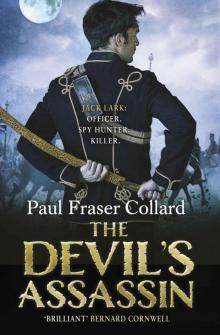 The Devil's Assassin (Jack Lark)
The Devil's Assassin (Jack Lark)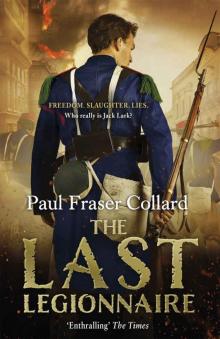 The Last Legionnaire
The Last Legionnaire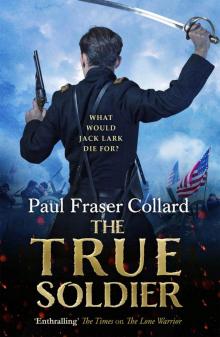 The True Soldier: Jack Lark 6
The True Soldier: Jack Lark 6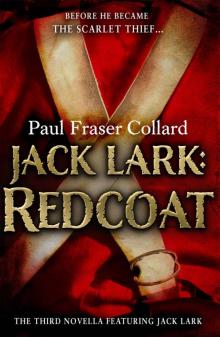 Jack Lark: Redcoat (A Jack Lark Short Story)
Jack Lark: Redcoat (A Jack Lark Short Story)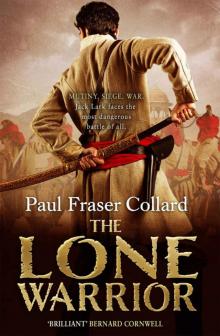 The Lone Warrior
The Lone Warrior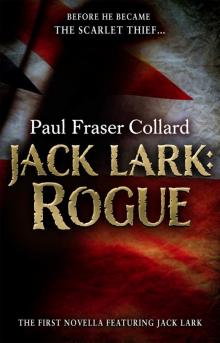 Jack Lark: Rogue
Jack Lark: Rogue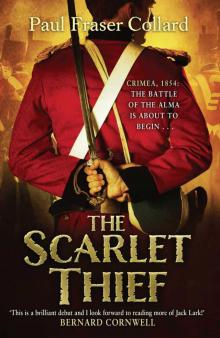 The Scarlet Thief
The Scarlet Thief